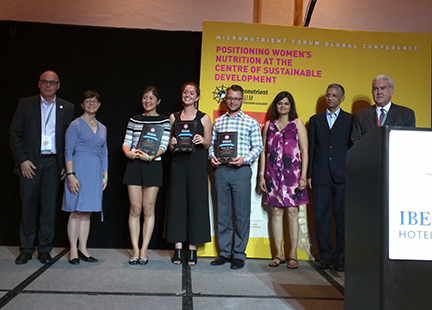
Notre Dame doctoral candidate, Nicholas Myers, came second in an elevator pitch contest at the Micronutrient Forum 2016 global conference in Cancun, Mexico. The Micronutrient Forum aims to be a global catalyst and convener for sharing expertise, insights, and experience relevant to micronutrients in all aspects of health promotion and disease prevention. It brings together researchers, professionals, students, organizations, and stakeholders to converse and collaborate in order to end malnutrition worldwide. The particular focus of the 2016 global conference was the positioning of women’s nutrition at the center of sustainable development.
The elevator pitch competition was sponsored by humanitarian nutrition think tank, Sight and Life, whose work aims to eradicate malnutrition among women of childbearing age and children. Participants in the competition were tasked with precisely and persuasively articulating their ideas on micronutrient innovation and entrepreneurship to a panel of judges and the conference audience in under a minute. An integral component of a young scientist’s career is pitching their ideas to secure research and investment funds and the elevator pitch competition gave participants the opportunity to demonstrate and sharpen their skills.
Myers, who was among 70 participants from 18 different countries, was awarded second place and a $1,000 prize for his pitch on the use of the Paper Analytical Device (PAD) to detect micronutrients. The PAD was originally designed at Notre Dame by Professor Marya Lieberman to detect counterfeit medications, and is being developed for many other uses in the Lieberman lab. In under a minute Myers effectively explained that detecting iodine in salt or urine costs several dollars per sample and has a turnaround time of days. He said, “We have created a rapid, field-friendly, lab-on-a-card that costs less than 50 cents to measure a sample. This technology has been proven in external lab studies in South Africa and Burkina Faso, and we are now seeking partners for manufacturing and implementation.” He added, “The paper analytical devices can support universal salt iodization programs by analyzing salt and urine samples with more than 90% accuracy, and we believe they can be easily adapted to analyze other micronutrients.”
Originally published by at science.nd.edu on November 28, 2016.